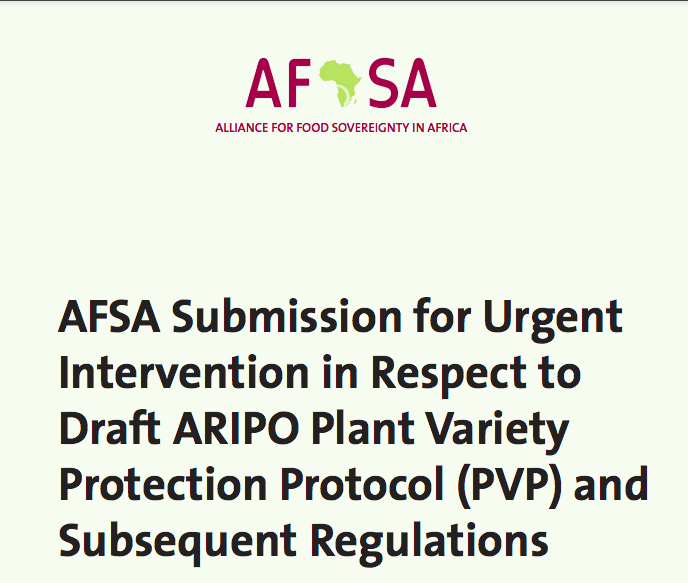Latest Resources

28 July 2016
ACB Preliminary comments on Draft Regulations Implementing the Arusha Protocol for the Protection...
Draft Regulations for the implementation of the African Regional Intellectual Property Organisation’s (ARIPO’s) Arusha Protocol for the Protection of New Plant Varieties (Arusha Protocol), were considered for adoption in June 2016. The proposed regulations included provisions designed to intimidate and force seed processors, seed suppliers, government certification officers and even farmers’ organisations to police and […]

11 June 2014
AFSA Makes Small Gains for Farmers’ Rights in Draft SADC PVP Protocol
AFSA members participated at a SADC Regional Workshop that took place 13-14 March 2014, in Johannesburg, South Africa. The aim of the workshop was to review the draft SADC PVP Protocol. After marathon, highly contentious and difficult discussions, AFSA members were able to persuade member states to amend key provisions in the draft SADC PVP […]

31 January 2011
Water Efficient Maize for Africa: Pushing GM Crops onto Africa
This paper looks at the Water Efficient Maize for Africa (WEMA) project within the context of the race by massive agribusiness corporations to bring climate change related crops to the market. The first part of the paper explains the WEMA project within this context, outlining the players and the stakes involved. It looks at who […]

28 October 2010
Synthetic Biology in Africa: Recent Developments
By Gareth Jones and Mariam Mayet The focus of this paper is the emerging field of synthetic biology, in particular its implications for the African continent. Synthetic biology combines a number of scientific disciplines and is generally understood to involve the deliberate design of biological systems, using standardised components that have been created in a […]

13 January 2010
Africa’s Green Revolution Drought Tolerant Maize Scam
Prediction of exacerbated drought in Africa due to climate change is apparently the driving force behind the establishment of the Water Efficient Maize for Africa (WEMA) initiative, another prong of the so-called ‘New Green Revolution for Africa’ WEMA seeks to develop drought tolerant maize varieties through a program which is being presented as a panacea […]

11 December 2009
Africa’s Granary Plundered Privatisation of Tanzanian Sorghum Protected by the Seed Treaty
A gene recently isolated from a Tanzanian farmers’ variety of sorghum may yield tremendous pros for multinational companies and government researchers in the United States and Brazil. Called SbMATE, it is not only useful in sorghum; but also may be used in other crops, including genetically engineered (GE) maize, wheat, and rice as well as […]

31 August 2009
Genes from Africa: the colonisation of African DNA
“You people. We thought you folks had taken everything you could. You took our land, you took our homes. You stole our pottery and our songs and our blankets and our designs. You took our language and, in some places, you even took our children. You snatched at our religion and at our women. You […]

19 June 2009
Revised African Model Law Biosafety Strategy Briefing June 2009
Haidee Swanby of the African Centre for Biosafety attended a meeting hosted by the African Union during May 2009 in Arusha, Tanzania on various biosafety initiatives of importance to the continent. In this briefing paper Haidee discusses the meeting and the issues and challenges lying ahead for the continent. Read here.

21 May 2009
Marker assisted selection (MAS): Key issues for Africa
‘Marker Assisted Selection’ uses molecular markers as tools in a plant or animal breeding programme to select for important agricultural traits, such as nutritional quality, drought tolerance, disease and pest resistance. It has been suggested that MAS has the potential to increase food production and help initiate a new Green Revolution in Africa. A much […]

14 February 2008
Displacing Africa’s Indigenous Food: Monsanto & AATF’s GM Cowpea Project
Nairobi based African Agricultural Technology Foundation (AATF) and Monsanto are set to introduce genetically engineered cowpeas in the coming years into the fields and tables of Africa. It will use Nigeria and Burkina Faso as key entry points, with Ghana, Cameroon, Niger and Mali comprising the second tier of countries that will be targeted. The […]
